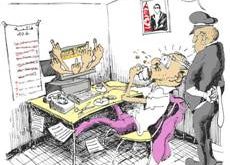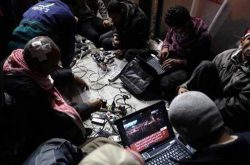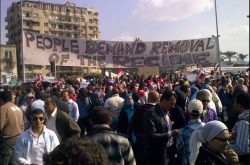In a thought-provoking essay, Jon W. Anderson poses the question: Is informationalization good for the Middle East? The notion evolves through a wealth of data, fresh comparisons and insight into factors such as telecom infrastructure, the monetization of data, the extraction of value upward, and how labor is valued in an informationalized economy.
Read More »Peer Reviewed Scholarship
From TUNeZINE to Nhar 3la 3mmar: A Reconsideration of the Role of Bloggers in Tunisia’s Revolution
Amy Kallander delves into the world of Tunisia’s educated and upper-middle class bloggers to reveal a more nuanced picture of their role in the Tunisian revolution. Reviewing the country’s unique history of Internet activism and government censorship, she finds that their impact was not only more limited than western media accounts claimed, but in many ways, more interesting.
Read More »Revolutionary Media on a Budget: Facebook-only Social Journalism
In one of the first studies of Egypt’s Rassd News Network (RNN), Yomna Elsayed explores how this Facebook-based citizen journalism network became the most influential news source during the revolution. Placing RNN in the context of alternative media launched on social networks, she explores the reasons for its success as well as the challenges that it faces.
Read More »Job Satisfaction and Editorial Freedom at Al-Arabiya: Finding the Balance while Covering Volatile Middle East News
In the first survey of its kind, Mohammed el-Nawawy and Catherine Strong study job satisfaction among journalists working for Al-Arabiya TV. They explore how the channel’s Saudi ownership and coverage of the Arab uprisings shape perceptions of editorial freedom, job security and job satisfaction, pointing to a new understanding of journalism values among news workers at pan-Arab satellite channels.
Read More »Beyond Egypt’s “Facebook Revolution” and Syria’s “YouTube Uprising:” Comparing Political Contexts, Actors and Communication Strategies
Sahar Khamis, Paul B. Gold and Katherine Vaughn compare and contrast the role of social media in the Egyptian and Syrian uprisings, providing a comprehensive review of the tactics used by both activists and regimes. The ability of new technologies to effect political change, they argue, is determined by pre-existing social, political and communication structures.
Read More »‘Not Ready for Democracy:’ Social Networking and the Power of the People–The Revolts of 2011 in a Temporalized Context
Robert Hassan argues that high-speed social networking technology disrupts the traditional rhythms of liberal democracy which, since the Enlightenment, have been based on the slower processes of print-based culture. Digital technology, he maintains, has propelled mass political action in the Arab world, but has left in its wake a political vacuum, with democratic processes struggling to catch up.
Read More »Rebuilding Egyptian Media for a Democratic Future
Dr Ramy Aly argues that Egypt's revolutionary moment is a golden opportunity to abandon old media practices that deprived many sectors of society of a media voice and privileged a narrow and elitist concept of what it means to be Egyptian.
Read More »The Debate Over Al Jazeera English in Burlington, VT.r
William Youmans analyzes the debate in Burlington, Vermont, over whether the local cable TV company should or should not carry Al Jazeera English. He concludes that Burlington was a special case, rather than the harbinger of a breakthrough into the US market for AJE.
Read More »Cyberactivism in the Egyptian Revolution: How Civic Engagement and Citizen Journalism Tilted the Balance
Dr Sahar Khamis and Katherine Vaughn give a comprehensive overview of the role of new media in the overthrow of Mubarak and wonders whether the same tools will enable activists to keep up the pressure for change during what could a lengthy transitional period.
Read More »Can Al Jazeera English Leverage its ‘Egypt Moment’ into an American Audience?
Al Jazeera English is campaigning for greater access to the US market, building on positive publicity about its coverage of the Egyptian revolution. But research by William Youmans and Katie Brown suggests that substantial prejudice against AJE persists among segments of the American public, even after they are exposed to its coverage.
Read More » Arab Media & Society The Arab Media Hub
Arab Media & Society The Arab Media Hub









